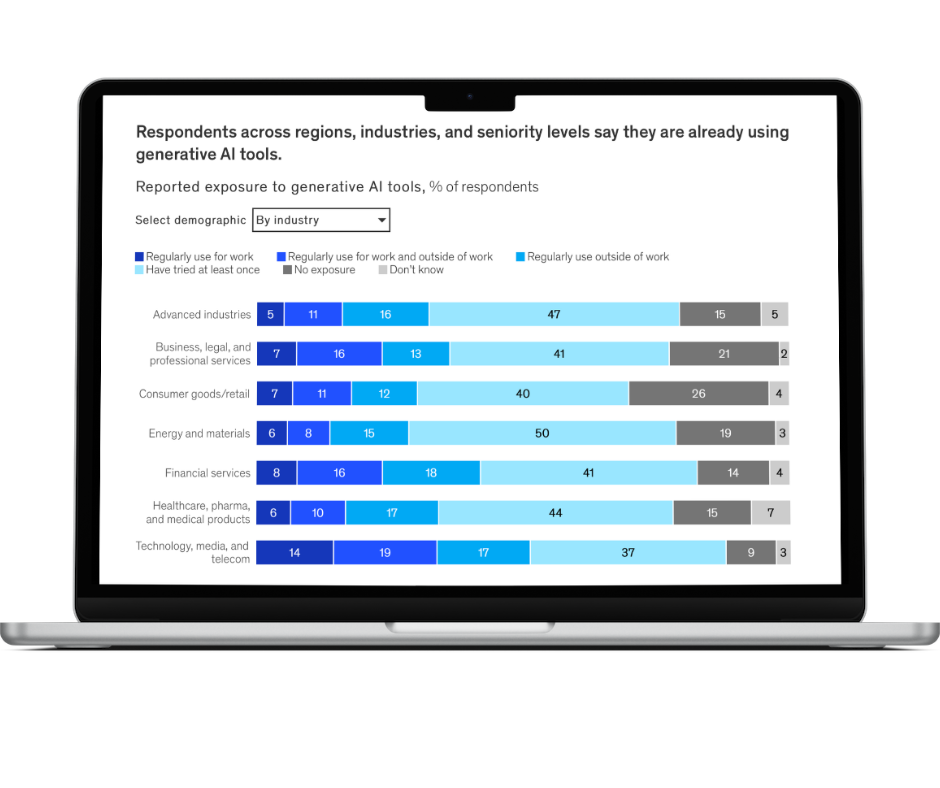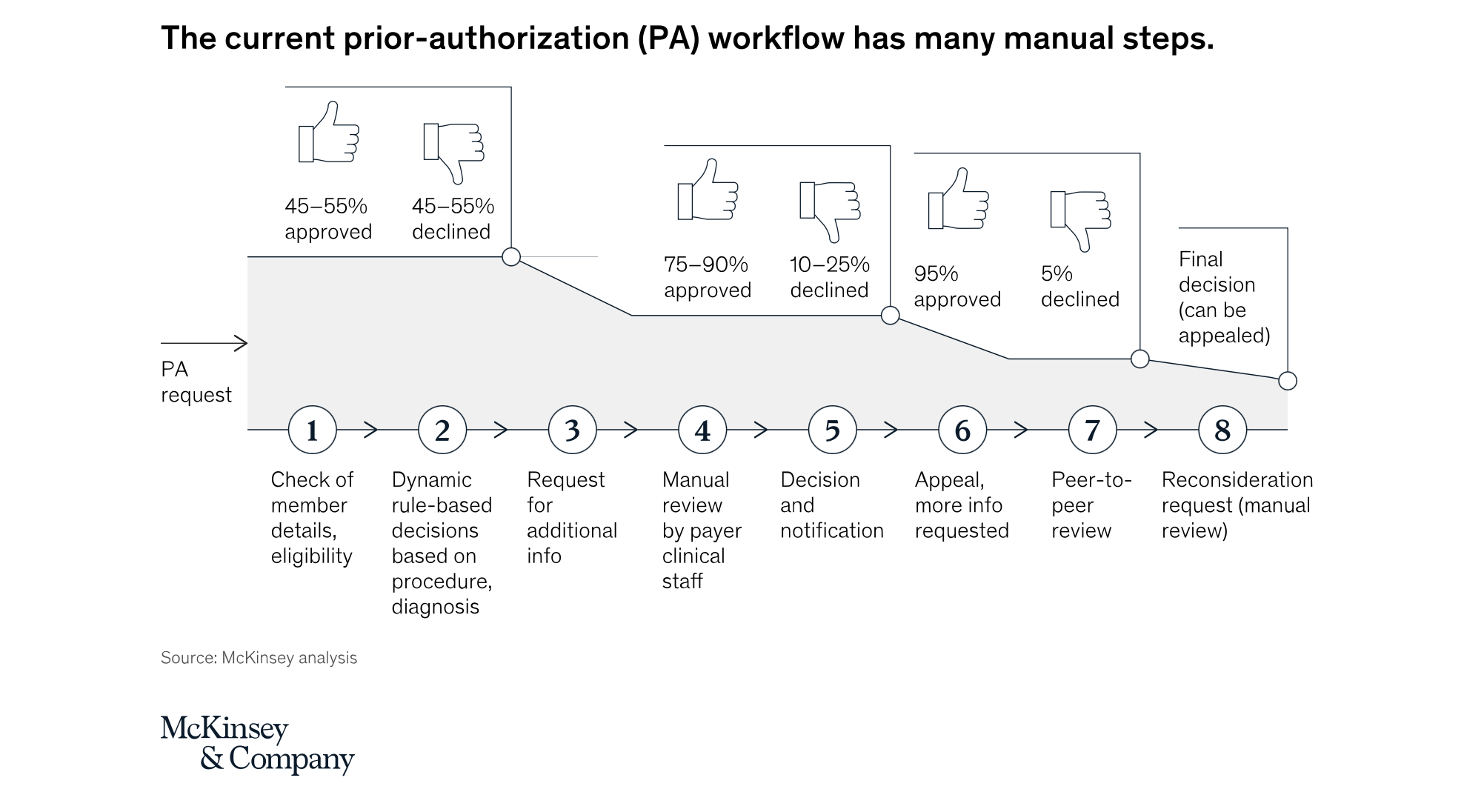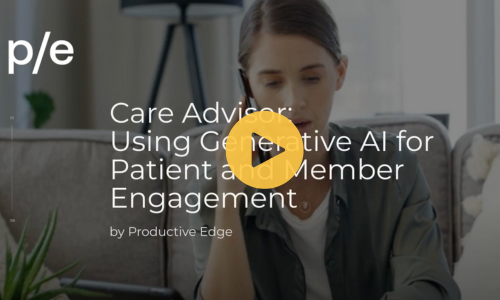In the rapidly evolving world of healthcare, the integration of technology with medicine is no longer a mere luxury—it's a necessity. Particularly in the age of value-based care, where the emphasis is on the quality of treatment rather than quantity, technological advancements play an indispensable role. A standout player in this transformative era is generative AI in healthcare, offering a promising future where each patient's care is personalized to their unique needs.
The Rise of Generative AI in Healthcare
It seems like just yesterday generative artificial intelligence made its debut, however, its use spread across healthcare like wildfire.
In fact, a McKinsey & Company survey, summarized in the following graph, reveals that 79% of respondents are familiar with gen AI, with 22% using it frequently at work. About 33% of these institutions use generative AI in at least one department, representing 60% of firms adopting AI. Additionally, 40% foresee more AI investment driven by generative AI, while 28% mention its discussion at board meetings.

Within the broad category of machine learning, generative AI refers to algorithms that create new data models based on the information they are fed. In the healthcare setting, this can mean developing intricate patient profiles, predicting disease patterns, or even automating administrative tasks.
The impact of generative AI on healthcare is manifold. From making accurate predictions about patient health trajectories to optimizing resource utilization in hospitals, this technology is redefining what's possible in modern medicine.
Driving Value-Based Care with Generative AI
Heart failure is the number one cause for admission in America, with more than 90% of the cases being preventable not by specialist intervention but by primary care.
This is why value-based care has increasingly become the cornerstone of modern healthcare. It aims to ensure patients experience the best possible treatment outcomes without unnecessary expenditure.
In this evolving landscape, Generative AI, renowned for its predictive modeling capabilities, has emerged as a key player.
AI’s potential in predicting patient needs is set to revolutionize healthcare delivery, creating a system that’s proactive rather than reactive. Take, for instance, the concept of analyzing a patient's complete medical history, genetic data, and even lifestyle factors. Generative AI can synthesize this vast amount of information, leveraging sophisticated algorithms to forecast potential health threats and significantly improve the accuracy of diagnosis and the prediction of disease onset.
Imagine a world where a patient's entire medical history, genetic data, and lifestyle factors are analyzed by sophisticated algorithms to predict potential health risks. This is the future of generative AI in healthcare, a world where preemptive measures can be taken long before illnesses manifest, dramatically improving patient outcomes.
Automation and Efficiency: The Administrative Revolution
A less-discussed but equally significant aspect of generative AI is its potential in healthcare automation. Administrative overhead currently accounts for 25% of total US healthcare spending and is one of the top-of-mind objectives of AI innovation. Tasks like prior authorization reviews, which traditionally consume significant time and resources, can be streamlined.
As you can see in the exhibit below, the traditional prior authorization review process entails heavy manual information exchange and is reviewed by payer clinical staff.

Unfortunately, this time and labor-intensive process is not only unsustainable but creates bottlenecks for patients when trying to get approvals for urgent healthcare treatment. Generative AI solutions like Productive Edge's Care Advisor, however, are able to power an automated chatbot that quickly addresses clinicians' questions about insurance coverage.
The tool can analyze vast datasets of prior authorization cases, learn from the decisions made, and apply this knowledge to new cases. The result? A faster, more efficient prior authorization review process, minimizing waiting times for patients and ensuring timely care.
But Care Advisor goes beyond improving the prior auth review process, its advanced generative models leverage Google Cloud's Vertex AI and Microsoft's Azure OpenAI Service to streamline processes and enhance operations in areas including medical coding and explanation of benefits, referral management, and care plan creation and management. Below is a quick video demo of how this cutting-edge solution works.
Harnessing Generative AI for Holistic Care
Any discussion about generative AI would be incomplete without touching upon the broader digital strategy in healthcare. The healthcare ecosystem is vast, with multiple touchpoints—from hospitals to pharmacies to outpatient care. Generative AI can serve as the backbone of a robust digital strategy, ensuring seamless integration across these touchpoints.
Patients today expect more than just reactive care; they seek an experience that's proactive, personalized, and efficient. By integrating generative AI into the larger digital healthcare framework, providers can offer an unparalleled patient experience, setting the gold standard for the future of healthcare.
Looking Ahead: The Boundless Potential of Generative AI
As we peer into the horizon, the potential applications of generative AI in healthcare seem limitless. From developing personalized treatment plans based on a patient's unique genetic makeup to predicting global population health trends, the possibilities are truly exciting.
Moreover, as generative AI continues to learn and evolve, its predictions will only get more accurate, ensuring that healthcare providers are always a step ahead in their care strategies. This is particularly significant in the age of value-based care, where the emphasis is not just on treating illnesses but on holistic health and well-being.
As generative AI continues to make waves in the healthcare sector, the promise of personalized patient outcomes becomes increasingly tangible. For patients, this means care that's tailored to their unique needs and circumstances. For healthcare providers, it means the ability to deliver this care efficiently and effectively, backed by the unparalleled insights of generative AI.
Want to learn more about the transformative power of generative AI in healthcare? Download our solution brief and see it in action in this video pilot.





